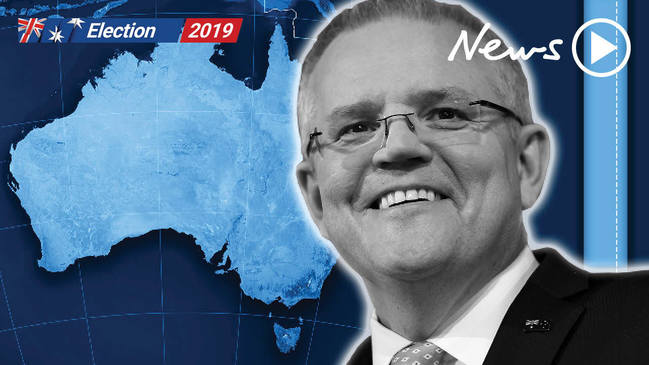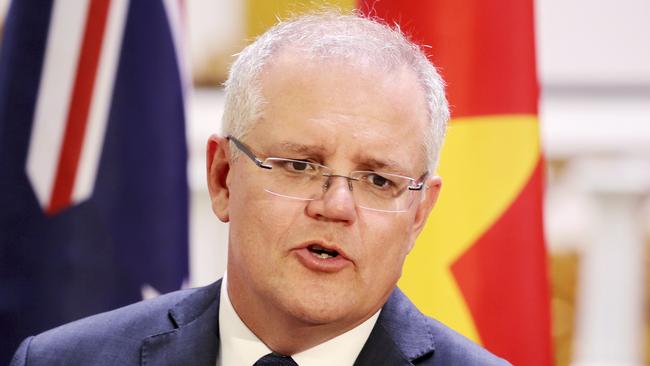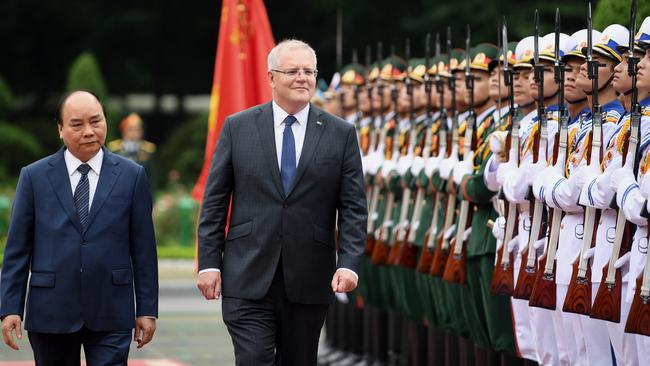Sharri Markson: One year in, this is what Scott Morrison needs to do now
Morrison is now in a uniquely strong position and can afford to use his authority in his party and with the public to tackle reform, writes Sharri Markson.

Opinion
Don't miss out on the headlines from Opinion. Followed categories will be added to My News.
Remember when Scott Morrison was mocked by the media for wearing baseball caps and praying passionately with his eyes closed?
When he was treated as a stopgap leader by many Liberal MPs who chose to quit politics rather than suffer the electoral defeat they were convinced they were facing?
It’s been a full year since Morrison emerged as the unlikely victor in the leadership battle between Malcolm Turnbull and Peter Dutton.

A year after Turnbull gave Christopher Pyne permission to whip the moderates behind Morrison, with bittersweet success in thwarting Dutton’s efforts and delivering Morrison the prime ministership.
But Turnbull then viewed Morrison as an illegitimate leader, urging him to go straight to the polls, to what would have certainly been a crushing defeat.
When Morrison refused and instead made Queensland and Tasmania his stomping ground, a ropeable Turnbull said his former treasurer just wanted to keep his arse in C1.
Morrison’s transformation as leader in the 12 months since those remarkable events is incredible.
What Morrison can point to more than any other recent prime minister is this: he has an innate understanding of mainstream Australians, their values and what they want from government.
Morrison himself is a social conservative who opposed same-sex marriage and is pro-life.
But his approach to politics, including when he deals with legislation around religious freedoms, will be pragmatic, even centrist.
There will be no culture wars under his leadership.

Apart from his factional allies, few Liberal MPs thought Morrison had the gravitas, leadership or authenticity to succeed in the top job.
He proved them wrong. It was no mean feat to unite the Liberal Party and win the federal election. He was relentless.
But Morrison has also cultivated a very clear identity as champion of middle Australia.
It’s for this group of voters that Morrison is governing and he has their image in mind when he announces policy, whether it’s his practical, not ideological, approach to environmental policy, or tax reform.
As one senior figure said: “He sees himself as a servant of the people.”
As Morrison himself said before the election: “I will burn for you.”
For all of his identifying with voters, the biggest criticism of Morrison after one year in the top job is his absence of an agenda for the Coalition’s unexpected third term in office.
Three months after winning the election, Morrison has still failed to outline bold reform for Australia.
In part, this is deliberate. His sense is that the public were tired of being promised a grand vision — think the 2020 Summit or company tax cuts — only to face the disappointment of politicians unable to deliver on their promises. Yet again.
The 2019 election was a referendum on a sweeping rebalancing of the tax system, on wealth redistribution and a giant reformist agenda. The vote was a resounding ‘‘no’’.
Morrison learnt a similar lesson when he attempted to increase the GST early on in his time as Treasurer. Now, he has a more pragmatic approach to governing.
The mood in the community, as Morrison sees it, is for politicians to just get on with their day job delivering a strong economy and managing basic programs. But to stay out of their face.

It’s why he is trying to limit his own media appearances, along with that of his ministers.
But Morrison does need to turn his mind to what he wants to achieve for Australia during his time in office. Is he thinking about his legacy?
Leaders have long shied away from tackling big issues, lest they face a leadership spill or lose public support. But they also, early in their time in office, have political capital to spend and time to buttress their fortunes before the next election.
Morrison is now in a uniquely strong position and can afford to use his authority within his party, and in the public, to tackle legislative agenda items.
There are the seeds of reform Morrison may embark on.
Industrial relations is the most significant and difficult reform Morrison is contemplating.
It will be the first time since John Howard that any leader has dared attempt it.
The Prime Minister is understood to be frustrated at the business community for failing to, once again, properly make the case publicly for reform while lobbying the government relentlessly behind the scenes.
This is fair criticism but there is a case for bringing the public along with him on important reform.
And, just because an issue is fraught or may be difficult to pass in the Senate is not a reason to not embark on it. But Morrison should retain his courage when approaching these thorny policy areas.
He could, yet, develop a strong legacy with indigenous constitutional recognition, laws to protect press freedom, IR reform and religious freedom legislation.
The difficulty as he continues to consider these issues is the challenges Morrison faces now are greater than when he took over as prime minister.
Against the backdrop of a China-United States trade war, concern of an economic downturn is mounting.
There is also a growing difficulty in how to deal with China, our largest trading partner but one that is flexing its muscles in our Asia-Pacific region, and, domestically, is stepping up its influence, surveillance and espionage activity.
It’s partly why, along with energy security, Australia joined the international effort after US Secretary of State Mike Pompeo’s request for our assistance in the Gulf of Hormuz.
It will be unspoken quid pro quo when we ask for the US to provide financial assistance in the Pacific, to counter China’s shamelessness in our region.
But if Australia is to have the strength to support our allies in an increasingly tense world, we will have to be in a position of economic, as well as military and diplomatic, strength.
Seen from that light, the need for bold reform moves to strengthen our economy is not just a nice to have. It’s a must-have.
